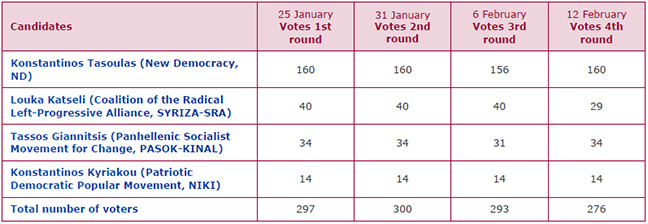Results
Elections in Europe
Corinne Deloy
-

Available versions :
EN

Corinne Deloy
Konstantinos Tasoulas (New Democracy, ND) won the Greek presidential election in the 4th round of voting on 12 February with 160 votes. He beat Tassos Giannitsis (Panhellenic Socialist Movement-Movement for Change, PASOK-KINAL) who obtained 34 votes. He will succeed Ekaterini Sakellaropoulou (ND), in office since January 2020 and who was the first woman to hold the supreme office in the Hellenic Republic.
In Greece, the President is elected for a 5-year term, renewable once, by the 300 members of the Vouli Ton Ellinon, the single chamber of Parliament.
Since the constitutional amendment adopted in November 2019, paragraph 4 of article 32 of the Constitution on the election of the head of state stipulates that the latter may be elected if he or she obtains at least a 2/3 majority of the votes, i.e. 200, in the first two rounds of voting. If no candidate can be designated in these ballots, a majority of 3/5ths (180) will be required in the 3rd round in order to be elected. If no candidate can be declared the winner, in the 4th round the candidate who obtains an absolute majority, i.e. 151 votes, is elected.
A 5th round may be held if the 4th round fails to produce a winner (it was not necessary this time). This round brings together the two candidates who obtained the highest number of votes in the previous round. The candidate who wins the relative majority of votes is then appointed President of the Republic. Rounds of voting are organised with an interval of 5 days between each round.
On 15 January, Prime Minister Kyriakos Mitsotakis (ND), by announcing his choice of Konstantinos Tasoulas as candidate, put an end to a 50-year tradition whereby the centre-right party nominated a centre-left candidate for the supreme magistracy and vice versa.
Furthermore, on the day of his nomination as candidate, demonstrators gathered outside the Vouli to protest against the lack of progress in the investigation into political responsibility for the rail disaster that occurred on the night of 28 February to 1 March 2023. A collision between a passenger train and a goods train travelling between Athens and Thessaloniki killed 57 people and injured at least 90 in Larissa, a town in Thessaly 150 km north of the capital. It was Greece's worst-ever rail disaster. The accident revealed serious shortcomings in the management of the railways, the dilapidated state of the rail network and delays in modernising the rail traffic safety system. Under Greek law, only parliament has the power to investigate politicians.
There were three other candidates in the running for the presidential election at the beginning of 2025. Louka Katseli, an economist and university professor, former Minister of Labour and Social Security (2010-2011) and of the Economy, Competitiveness and Maritime Transport (2009-2010), was backed by the Coalition of the Radical Left-Progressive Alliance (SYRIZA-SRA). Tassos Giannitsis, former Minister of Labour and Social Security (2000-2001), Foreign Affairs (2004) and the Interior (2011), was backed by the more moderate left-wing Panhellenic Socialist Movement-Movement for Change. Lastly, Konstantinos Kyriakou, a lawyer and member of the Albanian minority who was imprisoned in the jails of Communist dictator Enver Hoxha in the 1970s, was backed by the Democratic Patriotic Popular Movement (NIKI, or Victory).
‘Regardless of individual disagreements, the invisible thread that unites us must not break. It is this invisible thread that brings us together when we mobilise for a common goal or to prevent common harm. The harmonious functioning and cooperation of institutions, a calm political climate and the preservation of unity create a favourable framework for the achievement of political objectives’, declared Konstantinos Tasoulas after his election, adding “The President of the Republic, as the regulator of the system, is called upon to strengthen this framework, far from any partisan competition”.
The new head of state called for ‘a collective national effort and social solidarity’.
A native of Ioannina, a town in the north-west of the country, 65-year-old Konstantinos Tasoulas has a law degree and is a lawyer by profession. He was elected as a New Democracy MP in 2000 and has held this position ever since. He was Deputy Minister of Defence between 2007 and 2008 and Minister of Culture and Sport between 2014 and 2015. Appointed in 2019, he was the outgoing Speaker of Parliament.
The new President of the Hellenic Republic will take office on 13 March.
Results of the January & February 2025 presidential elections in Greece

Source: Greek Parliament
On the same theme
To go further
Elections in Europe
Corinne Deloy
—
25 February 2025
Elections in Europe
Corinne Deloy
—
28 January 2025
Elections in Europe
Corinne Deloy
—
14 January 2025
Elections in Europe
Corinne Deloy
—
3 January 2025

The Letter
Schuman
European news of the week
Unique in its genre, with its 200,000 subscribers and its editions in 6 languages (French, English, German, Spanish, Polish and Ukrainian), it has brought to you, for 15 years, a summary of European news, more needed now than ever
Versions :


